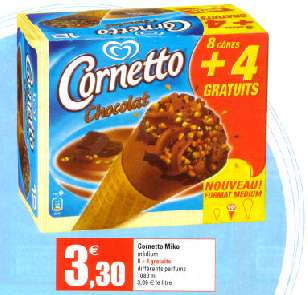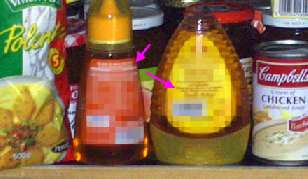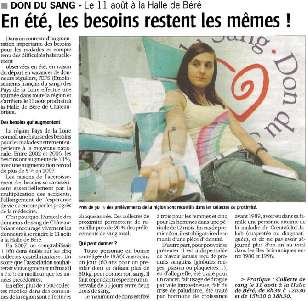Rick's b.log - 2008/08/11
You are 3.144.93.14, pleased to meet you!
Rick's b.log - 2008/08/11 |
|
| It is the 21st of November 2024 You are 3.144.93.14, pleased to meet you! |
|
mailto: blog -at- heyrick -dot- eu
The explanation is simple. CocaCola is "the serious one". It is... okay, I'm not sure how exactly to describe Coke, it's a rather unique sort of taste. Consider Coke to be like a red wine.
This little parable leads on to a phrase which strikes fear into my heart - "Improved new recipe". Can anybody nominate any food which actually benefitted from a make-over?
Apple Pies from a certain supermarket often compared with ASDA on TV adverts went to be horrible - I don't know what the hell they did, it was like most of the sugar was taken out of the apple gloop inside, and the pastry seemed to be made out of some revolting-texture vegetable oil. So not any comparison to Mr. Kipling, the authentic mini apple pies.
Other cases, it's like "more biscuit" (read "less chocolate"), or "healthier recipe" (read "butter replaced with colza oil, less cholesterol risk but tastes like crap"), or even "less expensive" (...for us to produce, we'll be generous and knock 2p off the retail price).
I think most of the wrecking of good food comes from cutting costs, and spazz do-gooders demonising sugar, salt, butter, etc...
And, ironically, as I write this, publicity (Intermarché 12-23 août 2008, p38) arrives showing Cornetto are launching a medium sized ice cream for those that giggle at the itty-bitty version but aren't able to cope with a whole cornetto all by themselves (that I must say certainly seem smaller than the ones I remember from my childhood in the '80s).
Am I cynical? I await nominations of foodstuffs that were improved by their make-over. And, for amusement value, why not send me your nominations for "stuff I liked that was right royally wrecked by an 'improved' recipe"?
I believe there are 'issues' with Chinese honey, and who knows, the honey you buy could be 99% Chinese and 1% Polish. Well, that's not a fib, it is from EU and non-EU countries, just like the label says.
I think it's about time our commercial apiculturists provided a detailed breakdown of the countries of origin of their product. But of course they won't. They have something to hide. A label stating "Produce of EU and non-EU countries" is testament of that.
If you can't read French, the important phrase is right at the end: "et de ne pas avoir séjourné plus d'un an au total dans les îles britanniques entre 1980 et 1996... so not only do they not want blood off of Brits, they don't want blood from Frenchies that spent more than a year in total in the British Isles between 1980 and 1996. Austria? Okay. Czechoslovakia? Okay. Turkey (a popular Frenchie holiday location)? Okay. But if you spent more than a year in the UK during that period, you're damned.
If you are an American, if I should talk about my pants (which I don't ever do, but if I did...) then you will think I am talking about trousers - hence phrases such as "corduroy pants". That isn't something really uncomfortable, it's just a rather dated style of trousers (I'm not entirely sure what pants are in American, "underpants" perhaps?).
The final definition comes courtesy of the curry-loving bloke from Red Dwarf, I think he was called Craig Charles? Anyway, he used "pants" as a word meaning rubbish; "oh, that was totally pants!", which is a bit dated (it's from turn-of-the-millennium!) but I still hear used from time to time.
While I'm here: I can stun you all with a brief explanation of the etymology of that thing babies and young children pee into, err... if you care. ☺
None of this explains two things: Firstly, when was towelling introduced? I can't imagine peeing into linen would be terribly useful - if you've ever spilt water onto a tablecloth you'll know it tends to sit on top for ages (while something like tomato sauce instantly soaks in and stains forever!). And secondly, what's with nappies for older children? If your kid is like six or seven and still requires diapering/(errr, nappying?) then surely (s)he would require the services of a child psychologist more than scaled up nappies? Or are modern parents being overprotective and this is a response to the late developers that have a tendency to pee in the bed until they reach double figures?
And on that delightful note, I'll bid you farewell until the next time!
RadioTimes is now €2,40
I reported on how to obtain RadioTimes in France a month ago. Since then, the price has risen to €2,40 (a 10¢ increase). I had wondered if it was down to transportation costs due the the wild fluctuations in petrol prices, but I notice that the UK cover price has risen to £1.05; so really I am only paying about 2p extra over that, which is not so bad.
The real thing?
Many years ago, a test was performed. Unmarked cups, one containing CocaCola, the other containing Pepsi. I believe this was part of a Pepsi marketing concept as it was known as "The Pepsi Challenge". Well, Pepsi won by a large margin. Because of the possibility of massaging results, either the CocaCola guys or some independent group performed the test again, and with a hint of deep irony, Pepsi got an even better score.
This prompted CocaCola to revise their product to be more Pepsi-like and it really didn't go down well with consumers, so the real CocaCola was brought back. This explains why in America (you may hear in US films/programming) it is called "Classic Coke". Classic, like how it was before they messed with it. Coke is it, coke is the real thing... if you're old enough to remember those adverts and the slightly edited "Robin Beck" song (that charted well and was played on The Pepsi Chart presented by the likes of (David) Kid Jensen!).
Pepsi, on the other hand, is the fun one. It's quite a bit sweeter. Pleasingly so. It probably won in the taste test because it hits your mouth with a bit of pizzazz. One sip and you feel better already - il vostro voluttà! Consider it a sparkling wine.
Now the sort of head-up-their-butt ponces that go all whoo! for a serious red (including sniffing it and yacking about its "bouquet" and such) would probably rather drink their own urine than have a sparkling white inflected on them - for that's the sort of rubbish people with no taste drink, and people with marginal taste drink with their desert course.
While the CocaCola/Pepsi divide is probably more personal preference than pseudo-snobbery, one thing for sure is that people who enjoy CocaCola probably won't enjoy Pepsi, and vice versa. I don't mean "make do", I mean "enjoy".
Often I get a six-pack of clone cola where each can costs €0,25, but when I want a cola to enjoy - it is always Pepsi. Mom, on the other hand, detests Pepsi, says it is too sweet.
In fact, the only CocaCola I ever drank in any amount was back circa 2002 when they had vanilla coke. If PepsiCo is listening....? ☺
My all-time favourite is a lump of chocolate with a nut in it. Don't remember it's name, but it was not "Walnut Whip". Anyway, it now offered 10% more chocolate (and about a 10% hike in price), yet if you read the ingredients list carefully, the amount of cocoa solids in each (old and new) was the same! So the newer costlier one did indeed have more chocolate, only a more dilute chocolate.
Oh, and be careful of "improvements" where the sugar is gleefully reduced, and replaced by "glucose-fructose syrup", some slime that I think comes from wheat?
This, coupled with the horrible patronising attitude of the governments - I used to like a King Sized Mars Bar. When I needed a good chocolate/sugar fix, that exactly hit the spot. While it may sound like I OD on sugar, I think I maybe had one or two a week, often in place of going and cooking something. Then it was all "fat people can't control themselves" so all the big portions vanished. I switched to KitKat chunky for my choccy fix (sadly no caramel) because when big Mars went, the alternative was to buy two (one isn't quite enough) and while I wouldn't say no to an extra mouthful of sweety goodness, I would say no to the price differential.

So where does honey come from?
I don't know about you, but some (most?) of the honey on sale over here (in France) states "Produce of EU and non-EU countries" (well, that's a translation). So, um... it's from planet Earth, right?
Given that stuff is supposed to have a country of origin, how can they get away with a statement like that?

What aren't they telling us?
I have mentioned in the past that we Brits cannot donate blood in France. Well, read the following article (if you can read French) which is from L'Eclaireur weekly local newspaper, issue 2008/No. 32 Vendredi 8 août 2008, page 6:

Now, exactly what is the British government not telling us? What happened between 1980 and 1996? 1996 is about when vCJD started getting into the headlines. Is this when it finally went public and it was actually known about, and covered up, from 1980?
Today's word, and then some!
Today's word is pants (pan-ts); which can have numerous meanings...
If you are a Brit, you are referring to underwear - which also goes by the cutely antiquated words "bloomers" and "knickers", basically a garment that Collins describes as "an undergarment reaching from the waist to the thighs or knees". This is also most likely the origin of "panties" for the female version.
This leads on to "pull-up pants" (often shortened to "pull-ups") which are either bib-and-brace trousers (US) or a style of nappy/diaper for older kids (Brit).
Brits call it a "nappy", which is likely to have originated from the French "nappe", which is a sheet (also 'tablecloth'). Back in Victorian days (and earlier), babies were often wrapped in long strips of linen called "swaddling", which was sometimes left in place for days at a time, which is really gross and I'm tempted to suggest that the word "swaddling" is from "waddling in s....!". The more affluent didn't want their young children sitting in their own effluent, so they would perform origami on linen or cotton sheets which became known as "nappies".
Ironically, the French use the word "couche", which also means coat or layer. Paint you only need to stick on the wall once is "monocouche". A nappy is a "couche (de bébé)".
In America, and terroritories with American influence, the English word for a nappy is "diaper" which seems like a really bizarre word until you discover that "diapering" is not only the activity of putting a poop-catcher on a child, it is also a style of fabric with a regular repeated design upon it. Early diapers probably had a really boring name like "TidyBaby®", but they became known as diapers because of the patterned fabric they were made from.
Anyway, this is another reason I'd like my daughter to arrive aged five or six. She might wet the bed awhile, but all that yucky nappy-changing stuff will be done with...
No comments yet...
| © 2008 Rick Murray |
This web page is licenced for your personal, private, non-commercial use only. No automated processing by advertising systems is permitted. RIPA notice: No consent is given for interception of page transmission. |